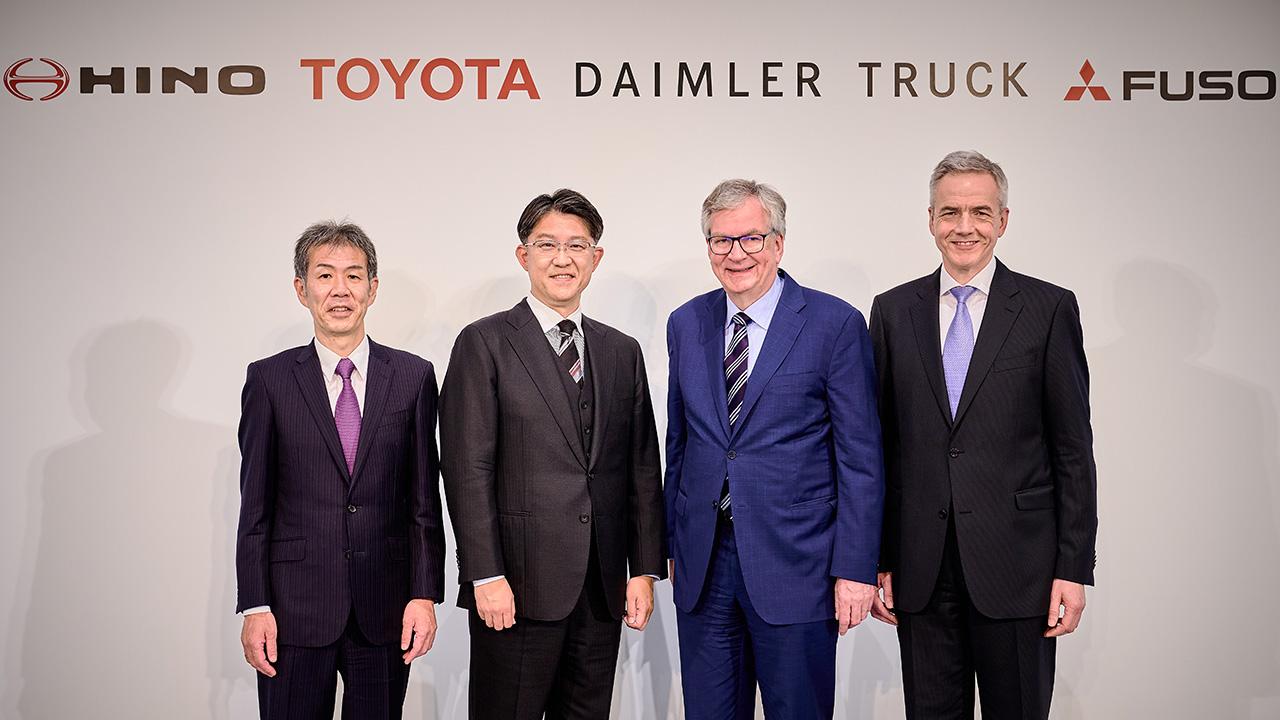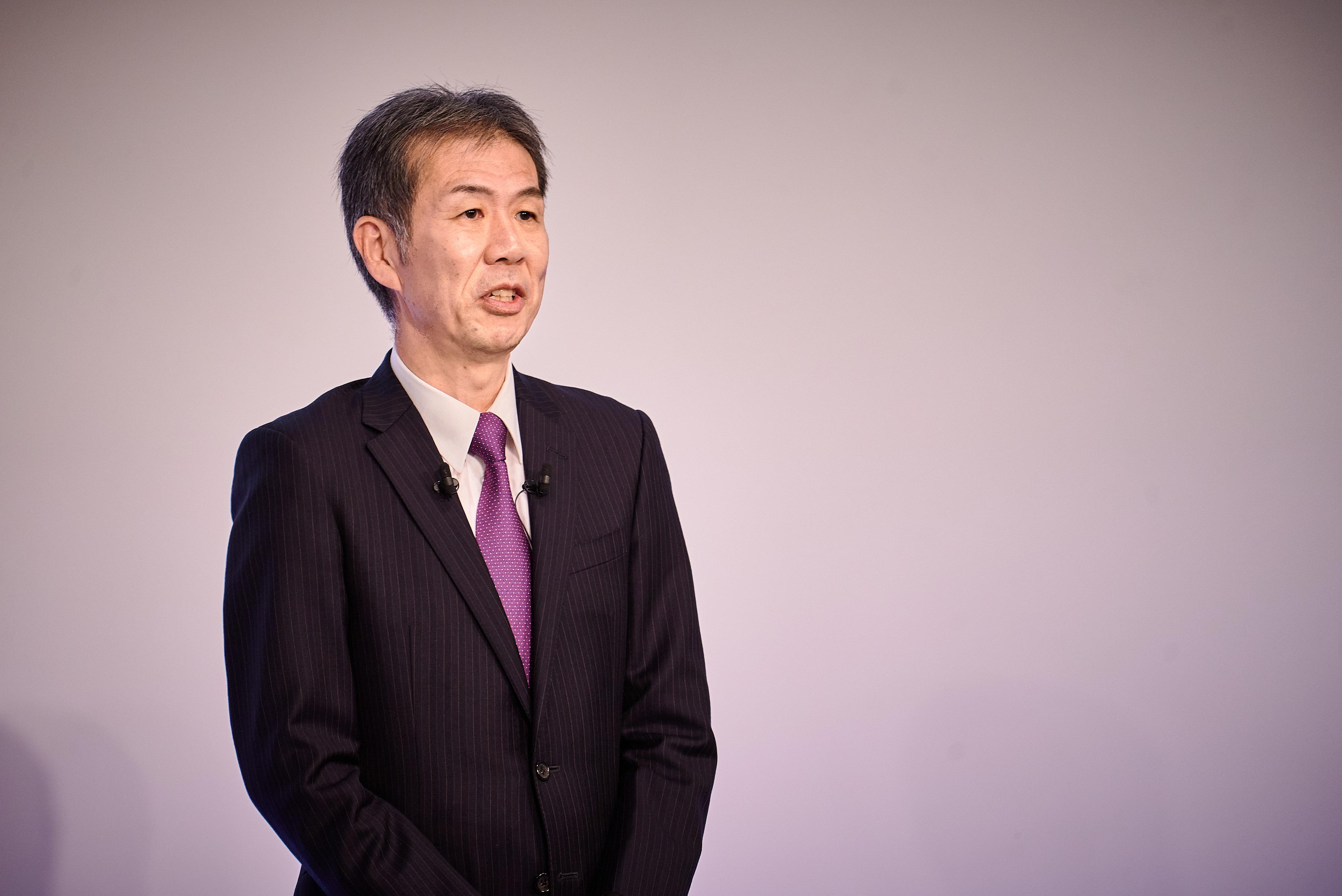
Two of Japan's top commercial vehicle manufacturers are merging. Together with parent companies Daimler Truck and Toyota, they seek the competitive strength to survive in the decarbonization age and shape the future of commercial vehicles.
The time for CASE technologies is now – President Ogiso (Hino)
The final speaker from the four partners was Hino President Satoshi Ogiso. His company is in the process of rebuilding from certification misconduct issues, while at the same time urgently developing technologies for the future.
Ogiso expressed his resolve to right the company’s course and contribute to human lives through the movement of goods and people.
President Ogiso

The certification misconduct that Hino disclosed last year is an issue we are taking very seriously. To ensure that our company does not allow something like this to happen again, we are pursuing the three areas of reform announced last October.
To regain the trust of our customers and other stakeholders, all Hino employees are engaging earnestly in each of these reforms.
Hino’s strength lies in contributing to our customers’ business in every aspect from sales to after-sales service, extending beyond the products themselves to overall quality, reliability, and maintenance.
As we work to address the misconduct issue and rebuild, many of our dealers and other partners, who have themselves been inconvenienced, are helping us in various ways to engage with customers and protect the Hino brand.
These experiences have keenly emphasized how important it is to revamp the company so that we can continue to contribute to our customers in the future.
At the same time, we find ourselves in a period of once-in-a-century transformation. We have no time to lose in developing the CASE technologies to address social problems such as carbon neutrality, driver shortages, and traffic accidents.
Even as we thoroughly address our certification issues, Hino has continued to look to the future by devising initiatives to tackle carbon neutrality and other challenges.
Together with our partners, we are constantly trying to figure out ways to fulfill the expectations of our customers and other stakeholders.
While our ongoing efforts to address the misconduct have started to yield results, it is very difficult for Hino to simultaneously deal with environmental changes such as carbon neutrality on our own.
Having agonized over this situation for a long time, we view the four-company collaboration as a golden opportunity.
Daimler Truck and Toyota are leading companies in commercial and passenger vehicles, with outstanding CASE technologies. Likewise, Mitsubishi Fuso has a long history as one of Japan’s commercial vehicle manufacturers. United in our ambition to contribute to society by supporting mobility, I feel a tremendous significance in moving toward the future with these three companies.
At Hino, we are committed to rebuilding our foundations following the certification issues, and to shaping the future as part of this four-company collaboration.
Mitsubishi Fuso and Hino were quick to establish a presence in the countries of Southeast Asia, engaging with local communities and helping to improve lives through the movement of people and goods. We believe this new collaboration is essential for ensuring that we can continue making these contributions into the future.
For Hino, this project will be a company-wide effort. After the merger scheduled for late-2024, we are determined to work with CEO Deppen and his colleagues to establish a close-knit team of mutual learning and respect.
“The future is ours to create together”
The new partnership means that Toyota now has capital ties, either direct or indirect, with all of Japan’s commercial vehicle manufacturers.
When asked about the synergies of these relationships, President Sato responded as follows.
President Sato
I believe it comes down to one thing: “The future is ours to create together.”
While capital ties and other aspects are very important, no single company can dictate the future faced by the automotive industry.
It is crucial that we facilitate greater collaboration and increase the speed with which our technologies become part of society.
Engaging in many partnerships allows us to simultaneously tackle a wide range of challenges on multiple fronts.
Ultimately, I believe this approach is vital for creating a more prosperous and productive mobility society.
“The future is ours to create together.” With this mindset, we will seek to make the most of every opportunity to deepen our collaborative partnerships.

